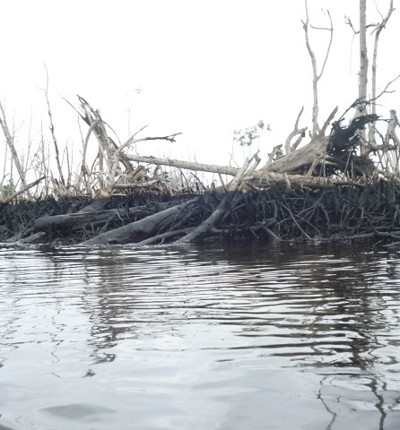
Shell fails in High Court bid to halt Nigerian Community's legal fight over clean-up
A High Court judge has today ruled that a Nigerian community should be allowed to continue their legal action against the oil giant Shell in the UK Courts to force them to clean up their oil pollution.
Posted on 29 May 2018
The Court refused to place any limitations on when the community could come back to Court to make sure the clean-up takes place properly.
Today’s judgment by Mrs Justice Cockerill follows a hearing on Tuesday (22nd May 2018) where Shell had attempted to block the Bodo Community from coming back to Court in England in the future.
The Bodo community is a fishing community of 30,000 people was devastated by two large oil spills that occurred in October and December 2008.
Shell failed to shut down the spills for over 5 weeks on each occasion.
As a result, the oil from the Shell’s pipelines caused the largest destruction of mangrove habitat in the history of oil spills.
In 2015, following litigation in the UK Courts, Shell settled the claims against the company for £55m and Bodo became the only community in the entire Niger Delta (out of hundreds of polluted communities) which is subject to an internationally recognised clean-up operation, the Bodo Mediation Initiative, sponsored by the Dutch Government.
In response to the clean-up initiative the Community agreed to put on hold an ongoing legal challenge in the London High Court to force Shell to clean up their environment. Their clean up case in the High Court is only the reason, they believe, that Shell finally engaged to clean up its oil. Since late 2017 clean-up has finally been progressing and the contractors have mobilised to site.
However, the community reserved the right to go back to court in the future if the clean-up was not taking place to an appropriate standard.
In June 2017 Shell tried to strike out the entire Community’s clean up case on the grounds that some members of the community had ‘obstructed’ clean up.
Shell’s account was flatly rejected by the Community who have filed evidence from Mr Kay Holtzmann, who was previously employed by the Bodo Mediation Initiative to lead the clean-up of the Bodo community in the Niger Delta.
The matter was adjourned by the Judge. Shell has now dropped their attempt to strike out the Community’s clean up case. Instead Shell has tried to make it practically impossible for the Community to return to Court in the event that clean-up fails to take place.
The Community is willing to ‘stay’ their claim but they remain convinced that they must preserve the right to return to court in the event that clean up does not take place to the requisite standard.
According to Leigh Day the lawyers for the community, Shell sought to impose onerous terms on the ability of the Community to lift any stay – the effect of which would be to kill off the claim. In particular they sought a clause whereby any disruptive act by any of the 30,000 residents of Bodo could lead to the strike out of the entire community’s clean-up claim.
The Community filed further evidence in support by Dr David Little, the former independent advisor to the BMI who represented the United Nations Environment Programme. He states that he was very concerned by the appointment of one of the clean-up contractors, INKAS, who are not qualified to do the clean-up. It is now clear that INKAS have been unable to do the required work to the appropriate standard
Dr Little and Mr Holtzman express alarm at the public health risks to the people of Bodo, not least in light of data Shell itself has obtained about the level of hydrocarbon pollution in Bodo.
Leigh Day has repeatedly asked Shell to put in place measures to protect public health. No measures have been put in place.
It is hoped that, after this judgment, Shell will concentrate their efforts on continuing to clean up the Bodo community. An effective clean-up of the community will not only transform the lives of the people of Bodo but also set the example that proper clean-up of oil pollution in the Niger Delta can be achieved.
The community now has the comfort of knowing that, if Shell fails to conduct an adequate clean-up in Bodo, they are able to ask the Court to make Shell do the job properly.
Dan Leader from the international team at Leigh Day said:
“The Community just want Shell to clean-up its’ oil. It has taken Shell almost a decade to start a proper clean-up process and even that is only because of the pressure of the litigation in London. The Court has rightly rejected Shell’s attempt to restrict the Community’s legal rights. Now Shell must show that it can deliver an effective clean-up otherwise the Community will not hesitate to hold them to account."

